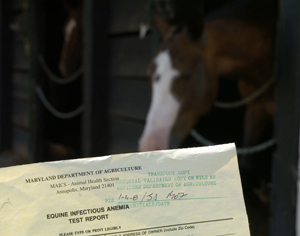Q: At the small barn where I board, there are several older, retired horses who live in one pasture and belong to the barn owner. The rest, who live in separate fields, are either pleasure or competition horses who sometimes leave the property for clinics, shows or trail rides. The owner of the retired horses does not have the vet pull blood for a Coggins test every year because she says that they are not leaving the property and, therefore, do not need it. I worry that not having this information for every horse on the property is potentially putting the others at risk. Should I be concerned about this?
A: The incidence of equine infectious anemia, the disease for which the Coggins test screens, is now extremely low in this country?low enough that some veterinarians of my generation are unlikely to see a single case during their entire careers. Thanks to successful surveillance with Coggins tests, fewer new cases are identified in the United States each year. For example, in 2001 there were 534 positive tests in the United States. In 2010, only 47 positive cases were identified out of 1.68 million tests performed, requiring a quarantining of 30 premises. (To prevent spread of the disease, all horses who test positive, along with any exposed equines residing within 200 yards, are immediately quarantined and/or euthanized depending on the outcome of repeat testing.)

Because there is no cure or vaccine for EIA and a small percentage of infected horses can survive and become symptom-free carriers, we use Coggins tests to keep surveillance on the disease and combat its spread. Horses must be tested prior to interstate travel, change of ownership or entering an auction or sale, according to the U.S. Department of Agriculture. Some states even require horses being transported within the state be tested as well. The tests are very affordable?generally between $20 and $30 each?so most boarding stables are reasonable in expecting their clients to test annually. Even when it’s not legally required, veterinarians also generally recommend annual testing of horses, depending on their exposure risk.
EIA is transmitted from horse to horse through the blood, either by insect vectors (horseflies, deerflies, etc.) or?in very rare cases?by cross-contamination of shared needles. Your horse’s risk of exposure, therefore, depends on his proximity to infected horses and the population of potential vectors in your region. Certain environmental conditions, for example, may expose him to more blood-sucking insects. The farther these insects must fly from the disease host to your horse, the less likely he is to be infected. So pasturing him alongside a carrier is much riskier than having one several miles away.
Newly infected victims of EIA experience signs such as a high fever, severe depression and loss of appetite. Most die within weeks. If a horse has produced a negative Coggins test at some point in his life and has not shown these signs since, it’s extremely unlikely that he has contracted the disease.
Because EIA is a fatal disease, though, it’s perfectly reasonable to ask your barn owner when her retired horses were last tested. If they all had negative tests and have not shown any signs since then, their risk to your horse is negligible.
On the contrary, if you are taking your horse off the property and mingling with other, unfamiliar horses, he’s probably more of a risk to the resident horses. EIA is still highly unlikely, but this older population may be vulnerable to other viral diseases that traveling horses bring back to the property. (The barn owner, therefore, should still continue routine vaccinations.)
Your vigilance about equine diseases is a great example for the entire horse community. Thanks to good horse owners like you, we’ve nearly eradicated EIA from the United States!
Cody Alcott, DVM, DACVIM grew up in Southern California, riding in rodeos and working with draft horses in pulling contests and other recreational driving activities, including camping with his family by covered wagon. “It was like a fancy RV, only with horses pulling it instead of a truck.” After graduating from Iowa State University College of Veterinary Medicine in 2004, he worked in an equine and small animal practice in Sacramento for several years. Since then, he has returned to Iowa State to teach equine medicine and pursue board certification in neurology. He still finds time to trail ride on the weekends.










